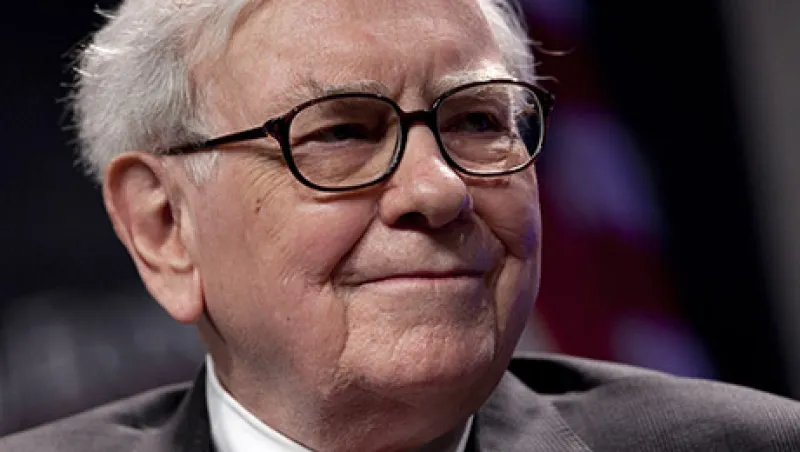Is it possible to mimic investor savvy? The iBillionaire index, as well as a related soon-to-be exchange-traded fund, aims to do just that by buying the same stocks as 21 billionaire investors including Warren Buffett, George Soros, Carl Icahn, Ray Dalio, John Paulson and Leon Cooperman. New York–based mutual fund firm Direxion, known for double- and triple-leveraged ETFs, is planning to launch the iBillionaire ETF in June.
“Instead of investing in each hedge fund, you can invest in an ETF that gives you exposure to all these different strategies,” says Raul Moreno, co-founder of New York-based iBillionaire. “So in a sense it works like a fund of funds, but only with the best billionaire investors in the world.”
iBillionaire uncovers its billionaires’ latest stock activity by scouring 13F forms, which managers with $100 million or more in assets under management have to file quarterly with the Securities and Exchange Commission. iBillionaire realizes 13F forms aren’t necessarily timely, so it also monitors Form 4s, which have to be filed by the end of the second business day after a purchase or sale. Form 4s are filed by investors or company officials who own more than 10 percent of a company’s stock.
The iBillionaire index holds 30 of the stocks in the Standard & Poor’s 500 index on which its select group of investors is placing its bets. According to Moreno, an advantage to this is that several on the iBillionaire roster are activist investors. For example, Icahn campaigned for Apple to buy back $50 billion of its stock, while New York–headquartered hedge fund firm Greenlight Capital, founded by iBillionaire-listed David Einhorn, filed suit against the Cupertino, California–based computer company in February 2013 in a bid to make it distribute more of its then $137 billion cash stockpile to shareholders.
The index has allocated 10 percent of its assets to Apple, which accounts for 18 percent of Einhorn’s $7.3 billion portfolio at Greenlight and nearly 9 percent of Icahn’s $30 billion portfolio, according to Whalewisdom.com, which tracks hedge fund managers’ performance and holdings by analyzing SEC filings. It shows that Buffett’s Berkshire Hathaway, with $104.8 billion in assets, has 20 percent of its assets in Wells Fargo, 16 percent in Coca-Cola and 13 percent in American Express — the index’s second-, third- and fourth-largest names. Back-tested during the past eight years, iBillionaire’s strategy returned 147 percent, whereas its benchmark S&P 500 added 42 percent, according to the company’s data.
Moreno and his iBillionaire partner and co-founder Alejandro Estrada have raised $1 million in venture capital to produce their index and an accompanying mobile app that alerts users about billionaires’ trades. Before launching the fund, 30-year-old Ecuadoran native Moreno started Kinetik, later relaunched as HIP, a mobile application that recommends other apps. He also spent several years with GFG Capital, a boutique asset management firm in Miami overseeing $1 billion in client assets. Argentinean native Estrada co-founded and served as CEO of DineroMail, a Latin American electronic payments system similar to PayPal, which was sold last year to South African media conglomerate Naspers.
“I think this is a great idea. It is what I call a retail investor’s hedge fund proxy without the 2-and-20 fee structure and/or illiquidity,” says Prateek Mehrotra, chief investment officer of Endowment Wealth Management, a registered investment adviser in Appleton, Wisconsin, with $50 million in assets under management. Mehrotra’s model portfolios include the Global X Guru Index ETF (GURU), which has a similar investing strategy as iBillionaire. Global X Guru monitors SEC filings from a select group of hedge fund managers and buys their top holdings and rebalances quarterly. The ETF, with $529 million in assets under management, returned 47 percent in 2013, compared with 32 percent for the S&P 500. Since its June 15, 2012, start, Global X Guru has returned 57 percent, eclipsing the S&P by 17 percentage points. But so far this year, it has underperformed, falling 5 percent while the S&P has ticked up 1 percent. GURU charges an annual management fee of 0.75 percent, versus 0.53 percent for the average ETF, according to ETF.com.
But this actively managed, smart-beta-style ETF may not be so smart, say other asset managers.
“Trying to ride the coattails of great investors doesn’t work well, because you’re late on the buy side but, maybe more importantly, you’re the last to know when they’ve sold,” says Chase Hinderstein, vice president of the Wise Investor Group in Reston, Virginia. Wise is part of Milwaukee-headquartered wealth management firm Robert W. Baird & Co., which has $105 billion in client assets. “The last eight years have been a particularly wild time in the markets,” he says. “It may not be representative of what this strategy will bring going forward.”
Herb Morgan, CEO and chief investment officer at San Diego–based Efficient Market Advisors, an active ETF management firm with $435 million in assets, also voices skepticism: “Can you imagine being an investment officer of a large endowment and telling your trustees you invested in an index, which was created through back-testing and simply copies other investors? Clients will think they might as well invest directly with Buffett or Icahn.”
Billionaires have had their share of blowups. Big bets on gold tarnished the investing records of Einhorn and Paulson in 2013. Soros, another investor listed on iBillionaire, lost $2 billion during the 1998 Russian financial crisis. Icahn, who owns about 17 percent of the shares in Herbalife, is in a battle with William Ackman, founder and CEO of New York hedge fund firm Pershing Square Capital Management, which has a $1 billion short position on the Los Angeles–based nutritional products multilevel-marketing company. In this case, only one of the two billionaires — both on the iBillionaire index — will walk away from the trade looking like a genius.






